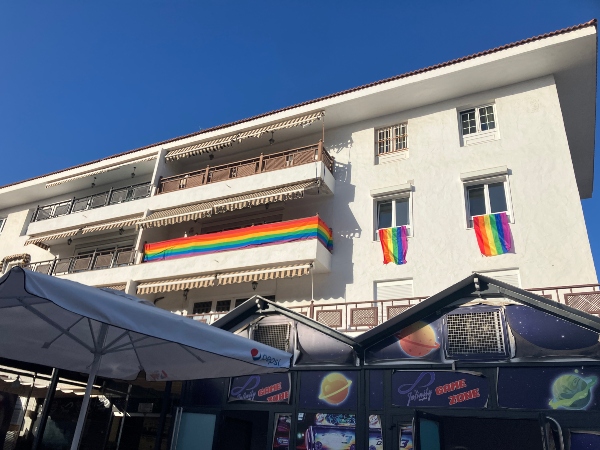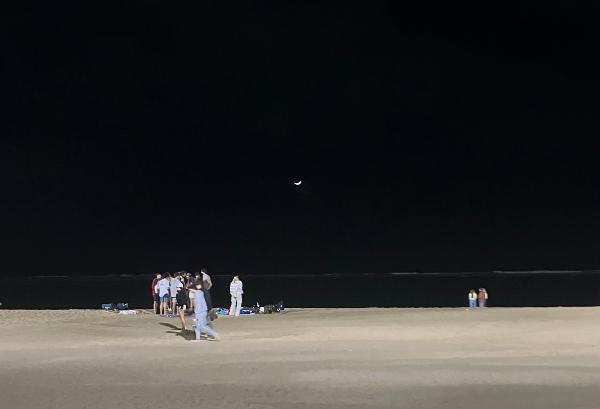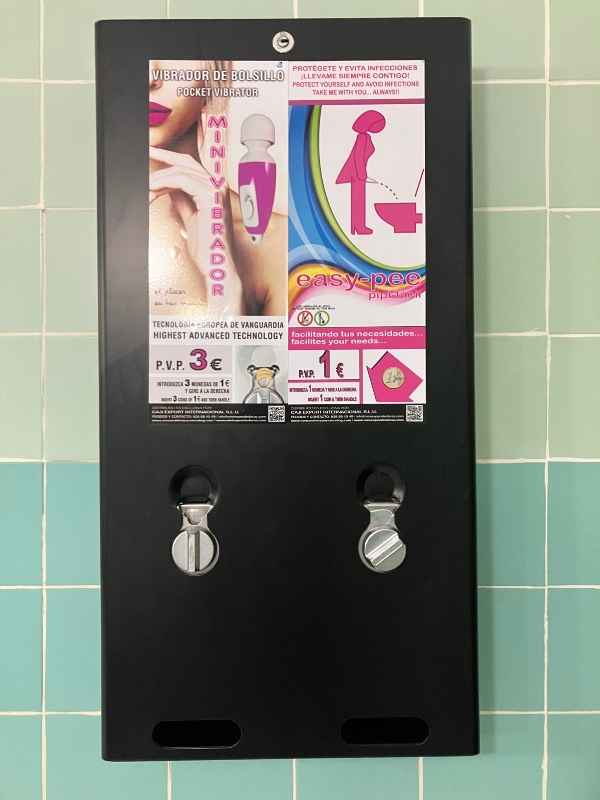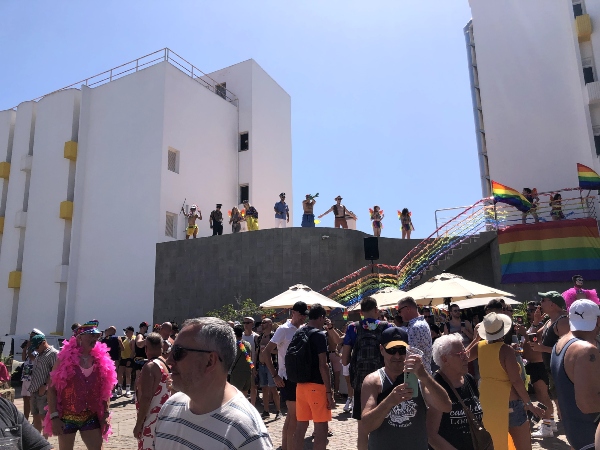…because here, you actually get two of them every year. And if you’re now thinking about marching slowly, dripping in the scorching sun at 40 degrees squeezed between barriers, as you had imagined the Pride parade so far, then you haven’t been to Maspalomas beach, where once you arrive, you will long to return for the rest of your life.
Our choice wasn’t accidental either, as the world knows how well they handle this Pride thing and not just that. There’s something to do here all year round, even if you want to dance, walk, or just exist with your partner as a lesbian.
Our goal was to see if the grass truly is greener on the other side. Or does it just seem that way from afar?! We wanted to find like-minded organizations. Perhaps we wanted to brag a little about how we do things here, even though they don’t call us to celebrate together in the street, but rather try to confine us within four walls so that we don’t disturb the public peace.
Of course, we didn’t find anything similar to us, as the goals here are different. There’s always more and better, but what could we expect from a place where a gay bar has been operating uninterrupted since the 1960s? Here, the task isn’t as big. So eventually, we tried to share our struggles and limitations with the local youth, and —what we loved most was— the local seniors, who were incredibly communicative and curious. Because it’s worth learning only from seasoned masters. We hoped to pick up something, and we certainly succeeded in terms of perseverance, because they just keep going here, tirelessly making life colourful.

And while it didn’t seem that they had no plans for the future, we still found it worth reminding them not to forget about the other half of Europe and our tiny little country, where we still only long for the freedom we could experience here for a few short days. Naturally, by the evening, the blazing sun and that mug of beer we sipped after the parade made their impact, so we invited a few young Spaniards and a few Austrian retirees who were enjoying the evening at one table to participate in the Budapest Pride, to come to our football cup, or go on a hike organized by qLit if they ever visit Hungary.
But let’s not get ahead of ourselves, the island is big, and the pride is small… or so you might think.
Gran Canaria is one of the Canary Islands, a volcanic archipelago belonging to Spain located in the Atlantic Ocean. I must confess, it never attracted me, especially not after the notion of vacationing in the Canary Islands became synonymous with expensive holidays, at least in my mind. Oh, but how wrong I was; I was foolish to have made a pre-judgement without having had a closer look at the object of my judgement… wasn’t I!
You can reach the island by plane, which costs about five times as much as a flight to Milan, the journey takes 5-6 hours, in return, it’s spring forever, the air doesn’t cool down even at night, making the stay feel like a delirious dream for a Hungarian. The people are kind, the old ladies are attractive, the fish is fresh, and as for the prices… let’s just say, with a bit of exaggeration, almost everything is cheaper than in our tiny little country. You can spend a lot everywhere, of course, but anyone who occasionally dines in a restaurant at home doesn’t have to live off “sobrasada” and bread rolls from the local Carrefour in Gran Canaria either. The island is also quite easy to navigate by bus, and it’s not too expensive.
You can pay for your ticket by card everywhere, even on buses rushing to the small villages. Few people speak English, and many places only provide a menu and not a drink list. This seemed suspicious at first, but one can get used to it. If you order a glass of good red wine, you don’t have to fear bankruptcy just because you didn’t see the price beforehand.
There is plenty of extraordinarily colourful hair and clothing, regardless of age and gender; many people push a puppy instead of a child in a stroller or a doggy buggy. People of all different religions and skin colours mingle together in the city in the evenings. Gay couples walk hand-in-hand along the beach, and no one pays them any attention. Even the moon throws itself back in sheer overwhelm at this all-encompassing acceptance and freedom.

You can see rainbow flags at every corner of the island; everyone is accepting everywhere. But as we headed toward Maspalomas, we felt we were about to witness something we could only dream of seeing at home or perhaps even less than that.
Already on the bus, an elderly lady smiled and winked at the young boys sparkling in glitter. The locals not only knew where we were headed, but they also clearly enjoyed this time of the year. Here, Pride is not a protest but a march, it’s not a fight for rights but a festival, it’s not fear but common recreation. We shared stories about qLit’s activities in Hungary just as we did about Hungarian goulash, and neither topic was unwelcome.
We arrived in the area well before the start of the parade to be able to look around thoroughly. We took a bus to the lighthouse, from where we planned to walk back across the sand dunes to Playa del Ingles, where we intended to have a quick lunch before the parade. The area around the lighthouse is home to more upmarket holiday homes.
Luxury brand stores line the beach, accompanied by great restaurants. We didn’t plan to linger there; we just wanted to find a restroom, which we successfully located in a seaside mini mall. The building of the mall was exciting in itself because the upper level was completely open, covered only by a shade, with the soft ocean breeze blowing through and birds flying beneath it. You’d think you’d have to travel a lot further for a place like this. But what we loved most was the vending machine in the restroom. They had thought of everything we wouldn’t have considered.
For one euro, we could have even purchased a female urination device, but we much preferred to try the automated 3-euro mini vibrator. If the photo doesn’t lie, we could have even attached this to our keychain to keep it handy if needed. Unfortunately, we didn’t have the right size coin for this purchase, so we would only be able to carry out this test during the winter pride, but we will definitely share our experiences with you then.

Because yes, indeed, there are two prides here – one in spring and one in winter. Both rather resemble a festival, with themed parties every day, cultural programs, concerts, and finally, the grand parade. But if that weren’t enough for visitors, every year on November 11th at 11:11, the iconic German Carnival takes place, where hundreds of men in a variety of costumes march to the local gay nudist beach. Or, for the more “teddy bearish” male counterparts, there’s the Bear Festival, which is a two-week program series for gay men, featuring wild parties and gay cruises, along with bowling, spas, naked yoga, and tantra classes to enrich the days of the lovely guests. But back to the spring pride.
The Maspalomas Gay Pride has been welcoming LGBTQI+ members from all over the world since 2001, but it was not this event that put the island on the community map. According to some sources, the annual carnival has been an important part of the residents’ social and cultural life since the 16th century. In 1986, the organizers took a step that drew the attention of the European press. They included a program called Miss Traveskarnatival Gala in their agenda, which was a revolutionary move that opened new doors not only for the trans community but also for European pride events. Now, there are programs almost year-round for non-straight tourists visiting the island. This winter pride is celebrating its 10th anniversary this year, so anyone who hasn’t felt the need to visit Europe’s gay paradise should quickly check the ticket prices.
As we approached the starting point of the parade, two things were particularly noticeable among the gathering of colourful personalities. The high number of supportive heterosexual couples and the low presence of law enforcement. We would have loved to chat with the police officers and volunteers on site, but there were no barriers, no police, and hardly a few people who seemed to be organisers. There were no counter-protesters, and what only became apparent later in the videos was that there were hardly any banners or cardboard signs with pain and demands on them. The balconies of the surrounding houses were filled with rainbow flags and waving supporters.

At this point, the event we were both dreading began as it is our custom that on the first day of our holiday, our periods made an appearance, making sure not to miss the party; along with it, our ability to be moved shot up to space. In other words, for the next four hours, we practically cried continuously. I’m not exaggerating; we didn’t just shed a few tears from being emotional, but we cried nonstop.
We cried because we had never experienced such a kind and accepting environment before, because old people and children were partying together, because there was no one present who would consider anything other than the principle of live and let live to be natural, and we cried because at home, it is different, very different. We cried because we have to go home and let go of each other’s hands as soon as the barriers of the Budapest pride no longer provide protection.
It was sad that some of the participants did not understand why we were crying, as it felt natural to them, but it was much sadder when one of them said they knew what we were talking about because they had heard about the situation we face at home.
By the end of the parade, we were sitting in a local bar by the roadside, where we could see everything clearly. We were exhausted from so many emotions, the good weather, and the unique atmosphere provided by the kind people; it was our souls that were tired.
Then, as we chatted with the locals and the “new locals” who had settled there, somehow this great sadness turned into hopefulness. We were no longer lamenting why it wasn’t like that at home but instead rejoicing in the fact that we had seen that it could be like this. We received encouraging words from the locals, who whispered that even here, the feedback is not 100% positive when a bar displays a rainbow flag, but the more places that display it, the more it becomes normal.
This tiny little island in the middle of the ocean didn’t create a miracle; it just helped bring the unknown closer. It opened channels between Austrian retirees and sequined boys in thongs, between bearded bikers and carpenter lesbians, among people who wouldn’t typically come together at first glance. It just needed a little mediation. Perhaps that’s the lesson: this is also our task, to build bridges – nothing complicated, just small bridges between people and people.
So, we will definitely check ticket prices for November. If you want to experience what we felt, you can find all the information about the winter pride at this https://www.winterpride.com/.
This trip was funded by the EuroCentralAsian Lesbian* Community and co-financed by the European Union. The content of this report is the sole responsibility of the project implementer qLit.hu and does not necessarily reflect the views of the EuroCentralAsian Lesbian* Community or the European Union.
Translated by Viki

